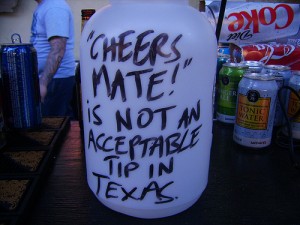There is a story (some say apocryphal) of my Great Aunt who embarked on a big trip in the 1950s. She being careful counted out every taxi fare and restaurant meal to the exact penny. When confronted by a burly taxi driver who said ” hey lady don’t they tip in your country, she turned on her heel and said “no”.
Tipping can be incredibly traumatic for travelers because customs and amounts vary greatly.
On a tour in the USA, our Grand Canyon tour guide chastised loudly a group of Scandinavian tourists for hopping off the bus without tipping him. They in turn were furious that they were “expected” to pay money on top of their tour fee. There are stories of New Zealand waiters in the 1960s chasing customers down the street to hand them back their change. (These days are long gone). My Australian hairdresser was bemused and confused when an US visitor tried to tip him.
In theory, a tip, or gratuity, is a small amount of money given voluntarily as a token of appreciation for service provided to a customer. A tipis considered to be the customer’s way of thanking an individual for for good service. A very small low tip, or no tip indicates that we feel the service was bad (or we are a mean person). Knowing what is the norm in the country you are visiting helps give a better experience. I was mortified to realise that in the USA bar staff expect to be tipped and I had never done it. For a while after that, I over tipped to compensate! I have since learnt to ask before a trip about tipping norms.
For business, it can get interesting and confusing. When I am travelling and I am being engaged by an Australian or New Zealand client, and I charge my meals back to them, I usually cannot claim from the client, any tips that I have paid . US clients expect that the cost of “reasonable” tips will be included in my expenses.
There seem to be five major groups of tipping countries:
1. Tipping is not part of the Culture
Don’t tip in Belgium, Finland, Iceland, Japan, South Korea. It is either offensive or irrelevant as hospitality wages are sufficient,
2. Tipping is tourism sector related
Generally in these countries, tipping is not the norm except in Restaurants (and sometimes just the tourist or expensive ones). My ex always used to ask the server who actually got the tip. In many of these countries, the tips are pooled and split between the staff or end up in the restaurant owner’s coffers. If in doubt discretely slip the server some cash.
China, Croatia (3-5%), Czech Republic, Germany, Ireland (10%), India, Kenya, Pakistan (only in expensive restaurants), Portugal (very small), Romania (10%), Slovenia (10%)
3. Tipping is a reward for good or extraordinary service
Usually server wages are higher in these countries and health and pension plans included! Tips wil never be refused but again check who gets it? In some countries your tip will never go to the staff. In others, it may be used to und staff extras such as parties or snacks or outings.
Argentina (10%) Australia (5-10%), Bosnia, France (few Euro), Greece (several Euro), Holland, Malaysia, Netherlands, New Zealand (5-10%), Nigeria (5%) Poland (10%), South Africa (any small change), Spain, Switzerland, Sweden, UK
4. Tipping is expected and may be the only way staff receive decent pay
The USA of course, notorious for paying staff below minimum wage and then expecting them to earn their income via tips. Travellers coming from low or no tipping countries often refuse to pay tips in a high tipping country as a protest without realising that individuals are being deprived of income.
Albania (10%), Chile (10%), Colombia (10%), Ethiopia, Hungary, Israel (10-12%), Jordan, USA (15-20%)
5. Tipping is listed on the bill as a service or labour charge
Be warned, you may end up paying for staff twice!
Brazil (10%), Italy, Paraguay, Thailand (leave small change when paying with a note in taxi or restaurant)




It is 0% for China. I should know because I am Chinese.
Same custom as South Korea and Japan of course.
A small correction/addition: Iceland, Norway and Denmark: Not expected, but appreciated in restaurants, hotels and tourist buses. In Norway and Denmark many restaurants print the bill with an extra (tip) line, left blank for guests to decide if they round up the figure.
Tipping is expected in India. 10% is the norm.
I think HK & Taiwan added 10%?
btw, can you provide some info on hotel tipping (bellman, porter, butler) for traveling on high end hotels in US & Europe?
by high end I meant 5 start or above.
The waitstaff in the US has always expected to be tipped above and beyond the service received.
Tip % has gone up and service has gone down.
Most of the people from the US traveling abroad have spoiled it for many of us by not respecting the local culture.
Tipping is out of control in the US – where it’s expected even for mediocre or poor service.
I’d have to agree about it being out of control… Was chastised by waitress as part of a group that left a tip .25 cents short of 15%. Bill was large and apologized profusely until we realized we were only short a quarter. Never would return and WORST thing ever to happen in a restaurant.
Most European countries add a service charge automatically to your bill (10% or 12.5% usually); tipping on top of that isn’t expected. Also Peter S. is right for China (and Hong Kong). Don’t tip.
A 10% service charge is automatically added to the bill at most Singapore restaurants, too.
As far as I know, tipping is part of Indian culture, at least in Restaurants and Hotels (to bell hops). Tips don’t need to be 15%, it can be much lower than that.
Some Auto Rikshaws (Tuk Tuks) and Cab drivers ‘expect’ tips too.
tipping is customary in India in expensive restaurants.
agree tipping is out of control in us. nowadays everyone cashier has a tips jar next to the register, even for to-go or order-taking they expect tipping. just because you have $ to spend for yourself on food or entertainment, you need to give some of that $ away (pay ur fair share of…) – the entitlement mentality in full swing.
Tipping is expected in the U.S. because restaurants normally do not pay waiters/waitresses minimum wage or only pay them minimum wage.
Tipping in Japan isn’t always 0%. High end ryokans do accept tips. Asking about a country’s tipping customs and exceptions to the general rule before traveling there is always good advice.
Regarding tipping tour guides – I haven’t come across one that doesn’t appreciate and accept tips.
Australia should be in #1 – tipping is not part of the culture (and we like it that way). Adult waiters (as opposed to junior wages) get at least $18 an hour not including penalty rates and overtime. I think NZ is in the same boat.